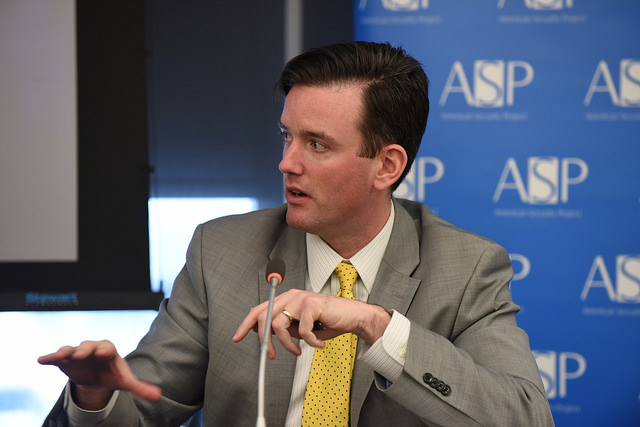 Holland, ASP's Director of Studies and Senior Fellow for Energy and Climate
Holland, ASP's Director of Studies and Senior Fellow for Energy and Climate
ASP’s Andrew Holland Quoted by S&P Global Market Intelligence on Trump’s Plan for Energy Market Intervention
ASP’s Andrew Holland was quoted in a June 15 S&P Global Market Intelligence article on U.S. government intervention in energy markets. S&P’s Taylor Kuykendall, a specialist on coal and energy, writes that preventing presidential intervention in energy markets “may need an act of Congress.”
On June 1, President Trump ordered Energy Secretary Rick Perry to take “immediate action” to stop further coal and nuclear plant closures, in the name of national security. As of June 15, Secretary Perry reports that the plans for this immediate action are “still being fleshed out.”
The legal precedent for Trump’s proposed intervention in U.S. energy markets comes from the Defense Production Act, designed in 1950 to give the president authority to ensure access to materials deemed essential for national defense. Some legal experts have questioned the legality of the President’s proposal, but ASP’s Holland points out that the courts have historically upheld White House economic intervention, even when it is “transparently political.”
Holland continues to state that the “real check” on presidential coal & nuclear intervention isn’t the courts, but Congress. Having worked with the Obama administration on a Defense Production Act-based investment in biofuels for the military, Holland adds that this executive authority has usually been invoked specifically for military needs. Under this administration, the president has cited national security as the reason for banning travelers from certain countries, imposing tariffs on U.S. trade partners, and now shielding the coal and nuclear industries from market forces.
Peter Harrell, former dep. asst. secretary for counter-threat finance and sanctions at the State Department, and current senior fellow at the Center for a New American Security, has called for Congress to enact new legislation constraining the president’s overuse of national security laws. If Congress is not proactive in limiting the president’s authority, ASP’s Holland says the proposed intervention could “create a huge amount of uncertainty” in energy markets, and slow investment in new capacity.
Even corporations that would benefit from this government intervention do not support the proposed measures. Curtis Morgan, CEO and President of Vistra Energy Corp., stated on Jun 12 that the policy would be “incredibly messy… almost impossible to implement… [and] wrong for markets.” Michael Webber, deputy director of the Energy Institute at the University of Texas at Austin, puts it simply: “I guess we don’t believe in free markets anymore.”
Richard Glick, a member of the Federal Energy Regulatory Commission, asserts that the transition from coal to renewable energy sources and natural gas is “pure economics,” as gas prices remain low and renewable technologies get “much less expensive.. beating out older technologies.” Moody’s Investors Service estimates that the 35 gigawatts of energy from coal and nuclear plants scheduled to be shut down in the next five years will be more than made up for by the 104 gigawatts expected from natural gas and renewable projects currently in the works.
Many energy producers, including American Electrical Power Company Inc., CMS Energy Corp, Exelon Corp., FirstEnergy Solutions Corp., NRG Energy Inc., PSEG Power, Southern Co., and Xcel Energy Inc. have been quoted by Bloomberg expressing plans to go forward with planned closings of coal and nuclear plants. And they are not closing these plants for altruistic reasons- New Energy Finance reports that over one-fourth of U.S. nuclear power plants don’t make enough money to cover their operating costs, and nearly 40% of U.S. coal-fired plants have either been shut down or designated for closure since 2010.
The President’s proposed intervention in the energy market is antithetical to the principles of a free market. It overreaches executive authority, as the closures of coal and nuclear power plants poses no imminent threat to national security. In fact, Chris Crane, CEO of the country’s largest nuclear operator Exelon, assured Utility Dive earlier this month that no such threat exists.
Keeping coal and nuclear plants afloat for a few more years will not turn the tide away from the growth of renewable power generation and natural gas. In fact, shielding the energy industry from market forces could cripple energy infrastructure in key U.S. regions, preventing the diversification in power-generation that can offset the disadvantages of any one energy source.
As ASP’s Andrew Holland states, this latest attempt to justify Presidential overreach with national security concerns is an example of “turbocharging” executive authority to unprecedented levels.





